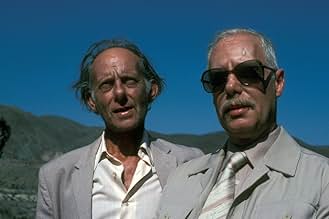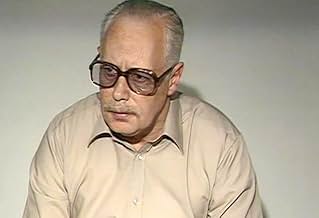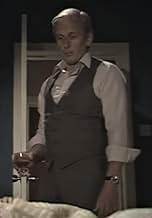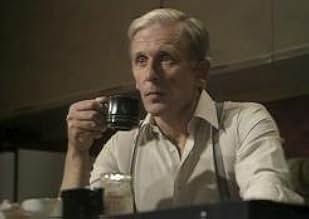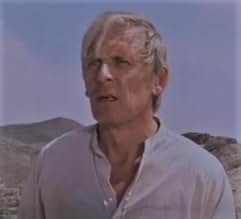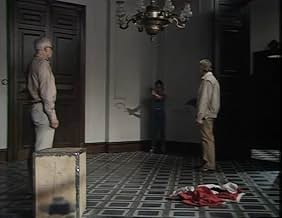Füge eine Handlung in deiner Sprache hinzuAfter WWII, ex-Gestapo officer Kessler flees as a war criminal, escaping with wealth to Paraguay to start anew as a businessman. He dreams of fascism's return while former Lifeline members h... Alles lesenAfter WWII, ex-Gestapo officer Kessler flees as a war criminal, escaping with wealth to Paraguay to start anew as a businessman. He dreams of fascism's return while former Lifeline members hunt him.After WWII, ex-Gestapo officer Kessler flees as a war criminal, escaping with wealth to Paraguay to start anew as a businessman. He dreams of fascism's return while former Lifeline members hunt him.
Folgen durchsuchen
Empfohlene Bewertungen
The first episode of the "Kessler" mini series is a re-worked version of the (unbroadcast) final episode of "Secret Army" (1977-79), "What Did You Do In the War Daddy?", which the BBC management had refused to broadcast in 1979.
As such, the first episode features the surviving cast of "Secret Army" - Albert, Monique and Natalie. This is great, but they only appear in the first episode (which sets up this series).
Overall, "Kessler" was disappointing. It didn't have the strong dramatic tensions which had made "Secret Army" such a success. Removed from his Gestapo post, and on the run, Kessler was no longer the sinister menace that had given the character such strength in "Secret Army".
And it was, of course, impossible to present the character sympathetically. This was a serious drawback to the series. The main character must have the audience's sympathy if we are to care what happens to him.
"Secret Army" had very successfully characterised its two Luftwaffe officers - Major Brandt and Major Rienhardt - sympathetically, by their contrast to the evil Kessler. But it was impossible for the writers to do anything with Kessler himself other than demonise the character. This seriously undermined the "Kessler" series, as there was never any chance for the audience to like the lead character.
The presence of the well-loved Resistance heroes of "Secret Army" might yet have saved the day. But that was made impossible by the decision to set the sequel mainly in South America, and to give it a completely new cast (for all but the first episode). Only Kessler himself continued from "Secret Army".
I was particularly surprised by the absence of Madelaine (Hazel McBride), Kessler's only friend in the earlier series, who might have stood at least some chance of showing up a human side to him.
As such, the first episode features the surviving cast of "Secret Army" - Albert, Monique and Natalie. This is great, but they only appear in the first episode (which sets up this series).
Overall, "Kessler" was disappointing. It didn't have the strong dramatic tensions which had made "Secret Army" such a success. Removed from his Gestapo post, and on the run, Kessler was no longer the sinister menace that had given the character such strength in "Secret Army".
And it was, of course, impossible to present the character sympathetically. This was a serious drawback to the series. The main character must have the audience's sympathy if we are to care what happens to him.
"Secret Army" had very successfully characterised its two Luftwaffe officers - Major Brandt and Major Rienhardt - sympathetically, by their contrast to the evil Kessler. But it was impossible for the writers to do anything with Kessler himself other than demonise the character. This seriously undermined the "Kessler" series, as there was never any chance for the audience to like the lead character.
The presence of the well-loved Resistance heroes of "Secret Army" might yet have saved the day. But that was made impossible by the decision to set the sequel mainly in South America, and to give it a completely new cast (for all but the first episode). Only Kessler himself continued from "Secret Army".
I was particularly surprised by the absence of Madelaine (Hazel McBride), Kessler's only friend in the earlier series, who might have stood at least some chance of showing up a human side to him.
I remember watching this when it was first shown on the BBC. It takes the story on, post-war, of what becomes of Gestapo chief Kessler. Hopefully UK Drama will show this - as they are now showing Secret Army.
All the superlatives about Secret Army apply equally to this. It may be a cliche, but drama like this makes the BBC license fee worthwhile!
All the superlatives about Secret Army apply equally to this. It may be a cliche, but drama like this makes the BBC license fee worthwhile!
The creators of this series originally intended to set it in an earlier decade - the 1960's - but the BBC objected on the grounds that this would cost more than a contemporary setting. The writers were told that it was deemed too expensive to hire 'period-appropriate' clothes, cars, props and locations; when they pointed out that the Kessler character would be quite ancient by the dawn of the 1980's (not to mention further removed from the events of "Secret Army"), the BBC executives apparently replied:"who cares, nobody will notice". Thus the cast and those behind the camera began the project with legitimate misgivings.
In "Secret Army", Kessler had a romantic relationship which made the character three dimensional and showed that even a cruel Nazi bigot had human dimensions. At the time, some people at the BBC felt that this factor might inspire too much sympathy for Kessler. Perhaps the Corporation's fear of the SS man being hero-worshipped explains why his loving companion makes no appearance in the subsequent series?
In "Secret Army", Kessler had a romantic relationship which made the character three dimensional and showed that even a cruel Nazi bigot had human dimensions. At the time, some people at the BBC felt that this factor might inspire too much sympathy for Kessler. Perhaps the Corporation's fear of the SS man being hero-worshipped explains why his loving companion makes no appearance in the subsequent series?
"Kessler" reminded me of a TV adaptation of a Jack Higgins novel. (This might be seen as damning with faint praise.) Three members of "Lifeline" (the Belgian group that helped downed Allied flyers), appear only in the first episode, then the series shows an underwhelming West German security agent and an Israeli girl (played by a future Playboy model) tracking Kessler to South America where he meets other Nazis - the Kameradenwerk. At the inevitable confrontation, there's a prolonged debate about Kessler's philosophy and actions, during which the agent exclaims "words, just words; people are sick and tired of them", which prompted me to agree, so drawn out was the discussion.
With a cast comprising mainly C list actors, it's not difficult for Clifford Rose's performance to stand out. For nearly all the time he wears large-framed spectacles that obscure much of his face, and on the odd occasion when he removes them his face does not appear to have aged as much as the series' timeline might call for, but his movements are convincingly those of an old man. (He himself was then in his very early fifties.) He portrays a wide range of emotions: love for his dead wife (Madeleine) and his daughter, revulsion for the human experiments carried out by some of the Kameradenwerk, nostalgia for the Third Reich and dreams of a Fourth Reich.
With a cast comprising mainly C list actors, it's not difficult for Clifford Rose's performance to stand out. For nearly all the time he wears large-framed spectacles that obscure much of his face, and on the odd occasion when he removes them his face does not appear to have aged as much as the series' timeline might call for, but his movements are convincingly those of an old man. (He himself was then in his very early fifties.) He portrays a wide range of emotions: love for his dead wife (Madeleine) and his daughter, revulsion for the human experiments carried out by some of the Kameradenwerk, nostalgia for the Third Reich and dreams of a Fourth Reich.
Difficult to watch. This is an overdrawn Boys of Brazil. With similarly thick accents. The plot is not gripping at all. The Israeli girl a poor actress. The show grows preachy (European country do so little to catch the war criminals that we are told with a straight Israel must do the job, the whol hit squad being a petite Sephardic woman), the Fourth Reich business was already laughable in 1981. The show is slow, hardly believable, the characters are hard to like, the "nostalgic" bits too frequent. Pass you way. Just watch the Secret Army, a far more subtle series (especially in its second and third seasons).
Wusstest du schon
- WissenswertesThe serial incorporates several elements of What Did You Do in the War, Daddy? (1979), the never aired final episode of Secret Army (1977) which was also written by John Brason: Kessler married his Belgian mistress Madeleine Duclos, who has since died, and has established himself as a major industrialist in West Germany under the pseudonym Manfred Dorf, Monique has a son in his twenties and returns to Brussels for the first time since the end of the war, Albert still owns the Candide in addition to six other restaurants and the surviving members of Lifeline reunite for the purposes of a documentary series entitled "In Our Time" which attempts to expose Kessler as a Nazi war criminal.
- Crazy CreditsThe opening titles start by displaying the letters SS which change to the name Kessler.
- VerbindungenFollows Secret Army (1977)
Top-Auswahl
Melde dich zum Bewerten an und greife auf die Watchlist für personalisierte Empfehlungen zu.
- How many seasons does Kessler have?Powered by Alexa
Details
Zu dieser Seite beitragen
Bearbeitung vorschlagen oder fehlenden Inhalt hinzufügen

